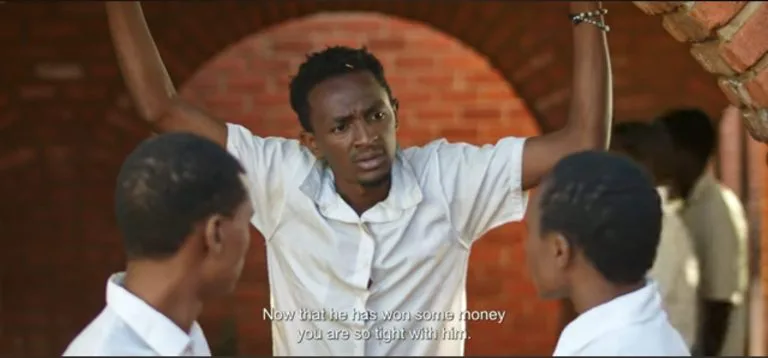
The film industry in Malawi is taking off, with a new generation of filmmakers producing high-quality movies that are gaining attention both locally and internationally.
One example of movies that made headlines recently in Malawi is “School Days” a YouTube release by 4Kaya Films Production, which has gained significant attention and praise from followers.
We cannot talk about TV series from Malawi without mentioning “Mushroom Shades.” The series, directed by Chaz Production, received great praise from people who love the Malawi film industry.
With the aim of uplifting the Malawi film industry, the Malawi Film Festival was introduced. The first festival, organised by FAMA, was held at Crossroads Hotel in Lilongwe on 25-26 November 2022 with the aim of promoting the Malawi film industry and providing a platform for local filmmakers to showcase Malawian culture and heritage.

Kelvin Maxwell Ngoma, a multi-award-winning actor based in Malawi, has played roles in movies like Fatsani, The Boy Who Harnessed the Wind, Khanda, Highbrow, and others.
Kelvin shared his thoughts on the current state of the Malawi film industry and its evolution over the years.
“I would say the Malawi film industry is taking a good turn compared to the past. We have made progress, but we are yet to reach a satisfactory stage as an industry. However, we are making significant strides and heading in the right direction.
“We now have great cameras, talented actors, good production teams, and compelling stories. What we need to focus on now is marketing and branding,” he said.
Speaking on challenges, Kelvin emphasised that the biggest challenge facing the film industry in Malawi is the audience and market.
He said, “The audience holds the key to the industry’s success, and no one can invest in a business that doesn’t show a promising return on investment.
“How can we attract investors to invest in our films? By demonstrating the business side of our capabilities, and how? By getting people to pay for our films, which will, in turn, attract investors.”

Regarding distribution channels, Kelvin noted that in Malawi, he has seen a few, including Kendall Kamwendo’s Luso TV online.
He advised those who want to venture into the film industry in Malawi to have a passion for their art. “You need to know what you want to do and what you want to achieve,” he said.
Kelvin expressed optimism about the future of the film industry in Malawi, citing the good productions of the past five years and the potential for even more amazing projects that will put the industry on the map.
Essim, a videographer, director, and filmmaker, said the Malawi film industry has made significant strides over the years, with promising developments.
“We’ve seen a rise in talented filmmakers, directors, and actors who are passionate about telling local stories,” he said.
Regarding recognition, he said Malawian films have gained recognition not only within the country but also at international film festivals, and this exposure helps showcase our unique culture and perspectives.
Speaking on the challenges the industry in Malawi faces, Essim said, “Despite our progress, we have limited funding, infrastructure, and distribution channels.”
He emphasised that filmmakers in Malawi should collaborate with the government and other stakeholders to secure funding, which can help address financial constraints.
Miracle Ndonani, also known as Cozizwa, said the Malawi film industry has everything it needs, but it lacks a market.
“In my experience, if there’s a market for movies, it will enhance production, and more production will challenge creators to become competitive and aim higher,” he said.
Speaking on film sound, he said filmmakers in Malawi value sound because it plays a huge role, but they’re not willing to invest in it as much as they would in pictures.
“Here at Zozizwa Wide, we have the capacity to deliver whatever is needed when it comes to film sound, but people are not willing to invest in all the details of having something productive,” Cozizwa said.
He added, asking the government to remove harsh taxes on equipment and create platforms where filmmakers in Malawi can access loans and grants.
Redison Kandozi, a Blantyre resident, said that the current state of the Malawi film industry is going in the right direction.
“I can say that the movie industry is going in the right direction. We can’t say that we’re at the same level as Nigeria and South Africa but we’re getting there,” he said.
“Nowadays, we can see that Malawi series are being shown on our TV stations, which shows that we’re on the right path,” he added.
Kandozi said the Malawi film industry is facing many challenges and the government can help.
“Quality, location, and costumes are the biggest challenges which filmmakers in Malawi are facing. The film might have a good story but if these things are not addressed, the movie cannot be interesting,” he said.
“These issues can be addressed if, as an industry, we have a school or courses where filmmakers, actors, or producers can go and learn about film production,” he added.
He added that the government can support the growth and development of the film industry in Malawi by having criteria for helping movies that talk about the roots of Malawian culture, and from the stakeholders’ part, hotels can allow filmmakers to shoot their movies in their hotels, which can be a marketing strategy for them.













